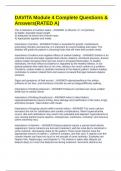DAVITA Module 4 Complete Questions &
Answers(RATED A)
The 4 indicators of nutrition status - ANSWER 1) Albumin >/= 4.0 (protein)
2) Stable, desirable target weight
3) Adequate fat stores and muscle mass
4) Appropriate appetite and intake
Importance of protein - ANSWER Protein is essential for growth, maintenance,
preventing infection and anemia. It is important for wound healing and repair. The
dietitian will guide the patient in choosing foods that will meet their protein needs.
Importance of sodium and negative effects of sodium loading: - ANSWER Sodium is an
essential mineral and helps regulate fluid volume, balance, and blood pressure. Excess
sodium intake increases thirst and can result in increased fluid intake. In healthy
individuals, the fluid in/fluid out balance is regulated by the healthy kidneys. In our
dialysis patients who make less or no urine, taking in too much sodium is a problem.
Therefore, sodium intake is carefully monitored in the dialysis patient. Sodium loading
contributes to sodium related thirst and causes increased fluid gain between dialysis
sessions.
Signs and symptoms of fluid excess: - ANSWER edema/swelling in the ankles,
puffiness in the face, and shortness of breath as well as fatigue/difficulty walking.
Importance of limiting potassium - ANSWER Potassium overload can cause sudden
death due to cardiac arrest.
Importance of limiting phosphorous - ANSWER when to take binders:
Hyperphosphatemia causes itching, bone damage and calcification of the heart, lungs,
and blood vessels. Take binders with meals.
Importance of keeping calcium within normal values - ANSWER Too much calcium
increases the risk for calcification and cardiac complications. When hypercalcemia
occurs, diet and medications may need to be evaluated and adjusted. Hypocalcemia is
rare causing painful muscle spasms, osteoporosis, numbness, confusion, and seizures
(when extremely low).
Importance of vitamins: - ANSWER Dialysis patients require a special renal vitamin
supplement. Some nutrients are lost each treatment, and the renal diet is restricted in
some nutrients- decreasing intake by the patient. These renal vitamins have the
appropriate amount of vitamin c, vitamin B complex, and folic acid. A regular over-the-
counter vitamin can have too much or not enough of some nutrients. Examples are
Nephro-Vite, Nephrocaps, and Dialyvite ®. The vitamin is taken after dialysis (on
dialysis days) so it won't be dialyzed out during treatment. Several B vitamins are
, needed for red blood cell production (anemia management) including: folic acid, B12,
and B6. Other nutrients needed in this process are iron, copper, and protein. Dialysis
patients may easily build up toxic levels of vitamins in their blood, especially vitamin A.
Therefore, they should consult their physician or dietitian prior to taking over-the-counter
medication, including vitamins.
Role of the Nurse and PCT - ANSWER Nurse: Communicates orders and order
changes; ensures proper lab draw; reviews medications; follows orders; maintains
medication lists.
PCT: reinforces education to patients; informs RN/RD/SW when patients share
concerns; communicates fluid issues, appetite issues, and complaints about
nausea/vomiting and diarrhea.
5 stages of grief - ANSWER Denial
Anger
Bargaining
Depression
Acceptance
what is KDQOL 36 - ANSWER an assessment tool for the social worker to identify
barriers
-the social worker compiles the results and develops goals with the patient
What id KDQOL used for - ANSWER To compile results, develop interventions & goals
w/PTs
ole of Social Worker- What RN & PCTS can so to assist - ANSWER Counselor,
educator, advocate, coach
There for PTs & family members
Your role is to listen, acknowledge, and inform social worker
When are psychosocial assessments completed? - ANSWER 30, 90, and annually
WHat does the acronym DARN stand for? - ANSWER Desire
Ability
Reason
Need
What are the 3 core comm skills to be used within the comm styles - ANSWER Asking,
listening, informing
What are the three basic principles of self-management? - ANSWER 1. Dealing with the
consequences of illness, rather than just the physical disease.
2. Focusing on problem-solving, decision making and patient confidence, rather than
just prescription and adherence




